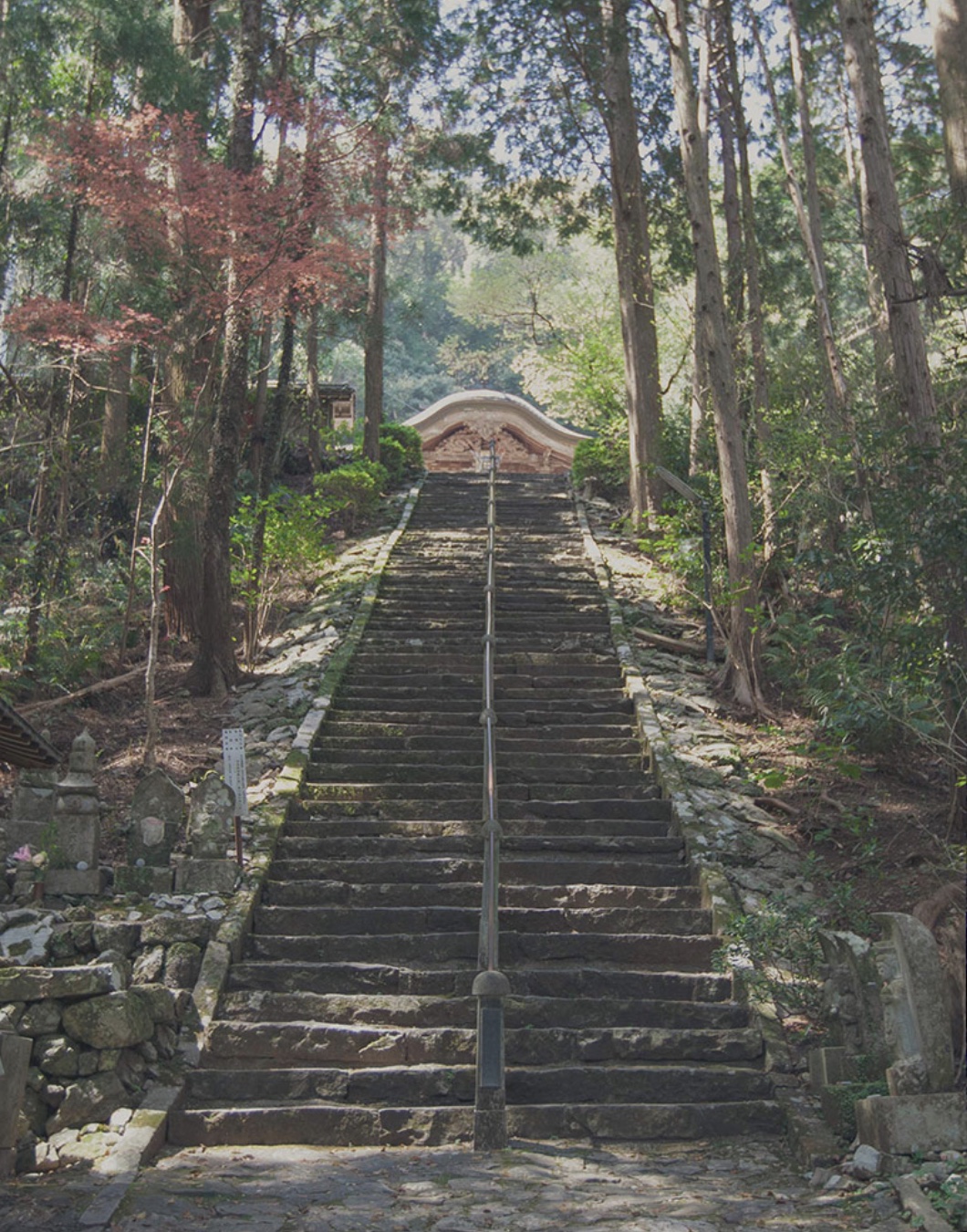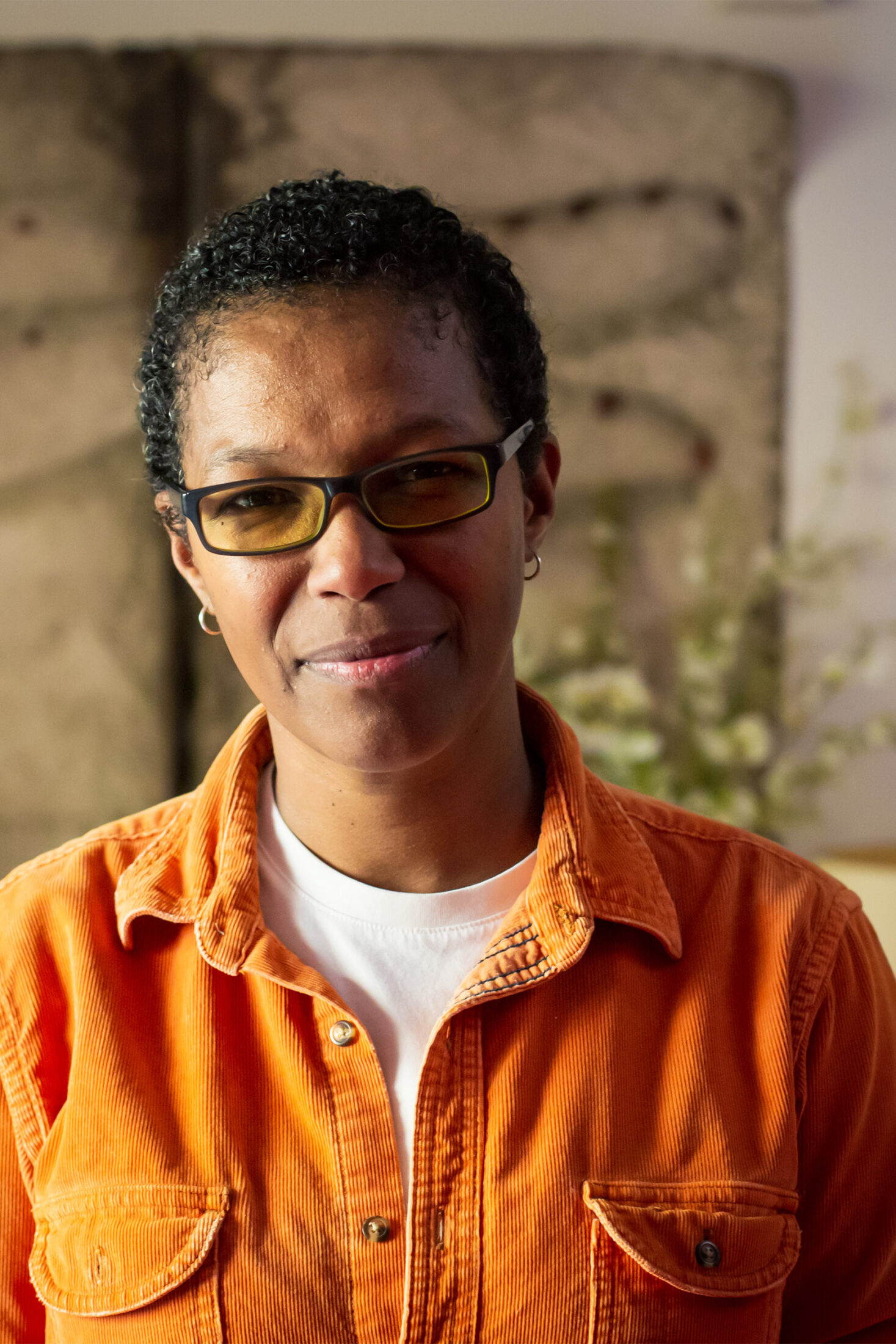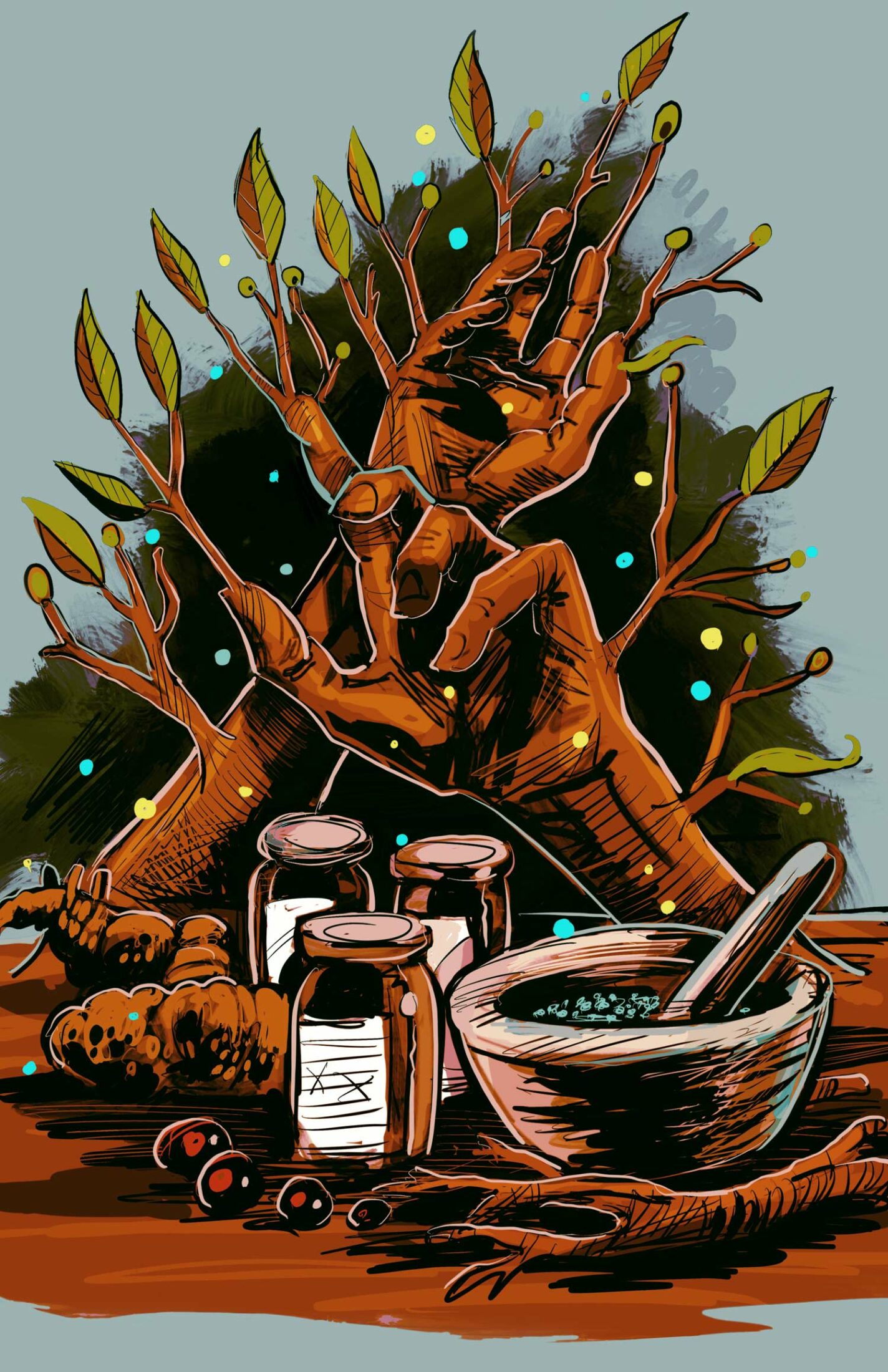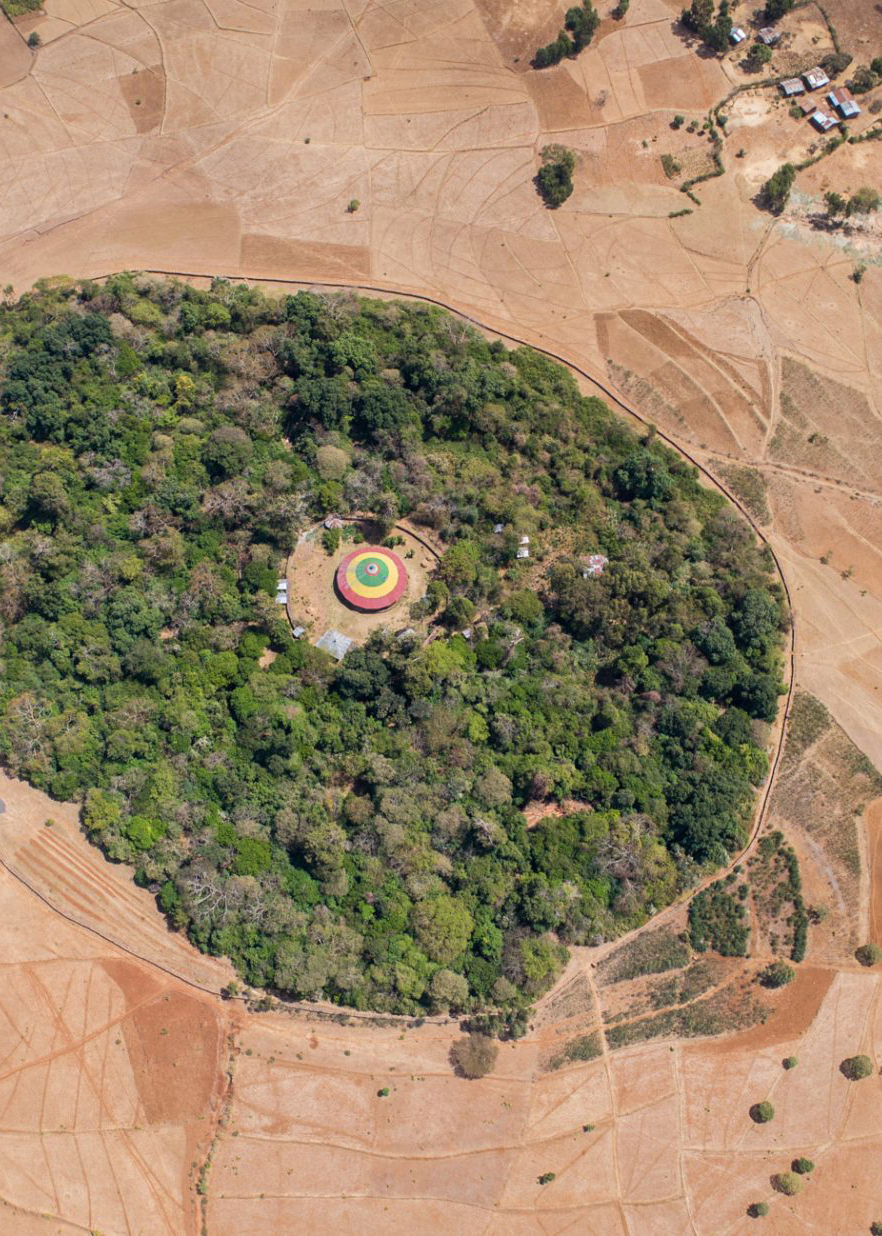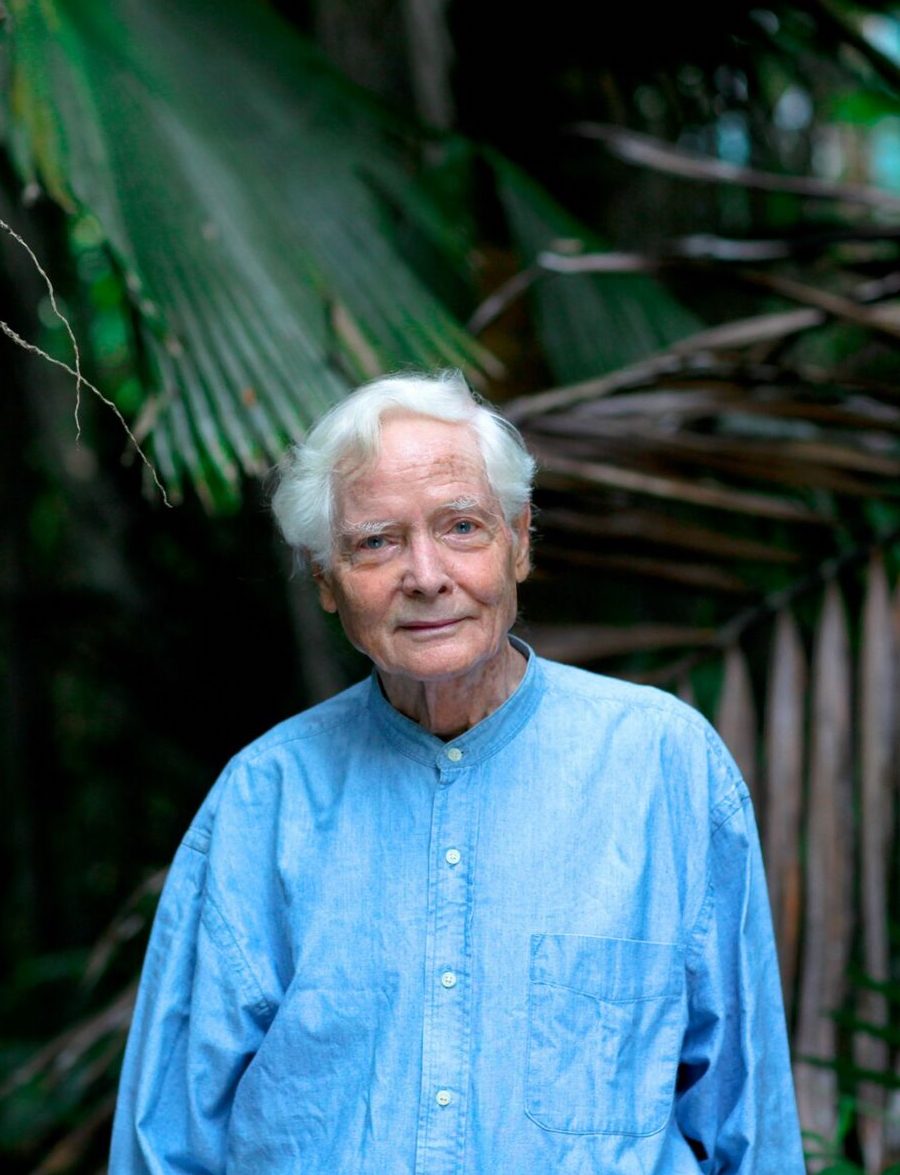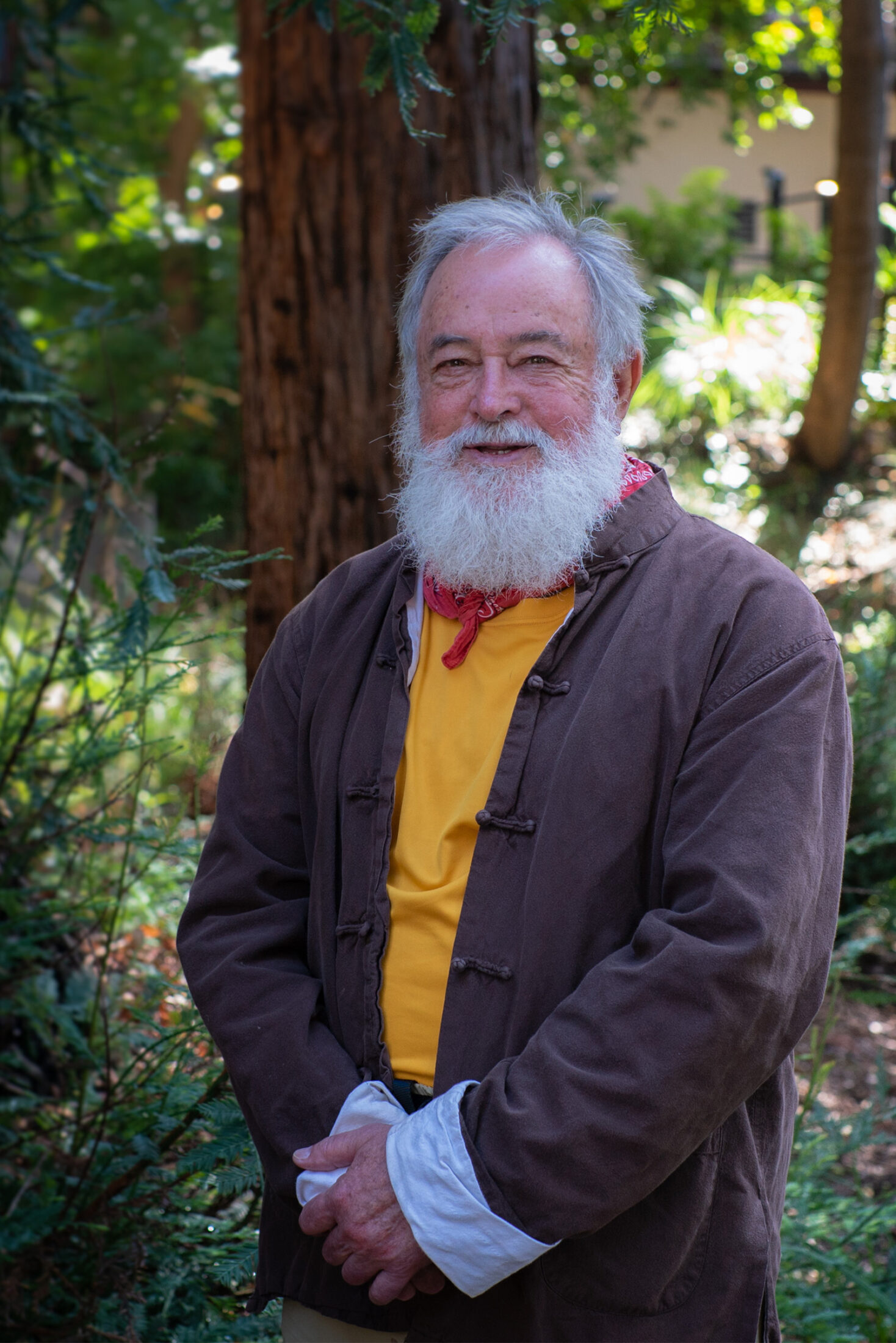
Lone Moon Lights Cold Spring
Bill Porter / Red Pine is a translator of Chinese texts and author. His translated works include The Lankavatara Sutra, The Platform Sutra, The Diamond Sutra, and The Heart Sutra. He is the author of Zen Baggage: A Pilgrimage to China and Road to Heaven: Encounters with Chinese Hermits. He has lived in Taiwan and Hong Kong, and has traveled extensively in China.
Chelsea Steinauer-Scudder is a writer based in northern New England whose work explores the human relationship to place. Her essays have been featured in Crannóg Magazine, Inhabiting the Anthropocene, and EcoTheo Review. Her forthcoming book is Rebirth: Mothering Through Ecological Collapse.
In this in-depth interview, Bill Porter, famously known as the translator Red Pine, reflects on his encounters with Chinese hermits and his long history with the great Taoist and Buddhist poets of China.
Transcript
Emergence MagazineIt’s great to be here with you, Bill. You’ve written numerous travelogues and accounts of your experiences in China under your given name, Bill Porter. But a lot of people know you by the name Red Pine, the name you use when translating Chinese texts and poetry. I wonder if we could begin with hearing how you chose that name and why do you use it?
Bill PorterRed Pine is a name I started using when I moved out of the monastery in Taiwan where I’d been living. I’d been living in two different monasteries for almost four years, where I was known as Victorious Cloud. When I moved out, I needed a new name. I couldn’t use Victorious Cloud on the street. Just before I’d left the monastery, the abbot had given me the poems of Cold Mountain with some pirated Burton Watson’s English translations of one-third of those. I had actually started looking at the poems and started translating them because I’d discovered that translating is a great way to learn a language. You can read something in Chinese and think you understand it, but if you try to translate it, you really discover areas that you don’t really know that well, so you work hard to get a better understanding. So, I was doing that and had moved to a farming village on this mountain outside of Taipei, and I had to support myself. In the monastery I didn’t need any money, they just took care of me. And so, I needed to teach English, which is the first thing you do in Taiwan to make money as a foreigner. Every Monday, Wednesday, Friday night from six to eight, I would teach English conversation. But I had to take a bus to come down the mountain to do that.
One day on the bus, the bus stopped at this big billboard advertising Black Pine Cola, and I said, “That’s it, that’s the name.” But black is a Japanese color; red is the Chinese color. So, I started using the name Red Pine. And a couple of months later, I was doing some reading, and I discovered the first great Taoist in Chinese history was Master Red Pine. He was the Rain Master of the Yellow Emperor, so I was really surprised. It’s a real name!
And also, it began to explain to me this connection that I feel as a translator. As a translator—I don’t know how other people do it because I learned all this on my own. The way I do it, I sort of become a shaman. I find a no-man’s-land between me and Cold Mountain, say. Also, when I’m working on things, the weirdest things happen. I’ll be looking for some information, and I’ll just open a book, and there’ll be the information I’m looking for, right staring me in the face. It happens over and over, so I just assume that I’m getting help from Master Red Pine. And so my translations are indebted to Master Red Pine. So, that’s why I’ve continued to use that name—because it explains to me where a lot of what I’m getting is coming from.
EMIn reading Red Pine’s translations, and Bill Porter’s travelogues and stories, you get such an incredible sense of a journey through time and across cultures, and I wonder if we could just go back to the beginning and hear how you came to China in the first place, and what you were looking for that brought you there?
BPWell, I was getting a degree in anthropology from Santa Barbara in 1970, and I didn’t want to go out into the world and work. So, I thought I would go to grad school. I thought I would apply to Columbia University because they had a wonderful department—Margaret Mead, Ruth Benedict, a lot of great anthropologists were teaching at Columbia in the ’70s, so I applied to Columbia, but I didn’t have any money. I was getting a little bit less than a hundred dollars a month from the G.I. Bill because I’d been in the Army. Anyway, I was checking all the financial aid, and there was a language fellowship available, but it had to be a rare language for a Westerner in 1970. I’d just read a book called The Way of Zen by Alan Watts, and it had these Chinese characters in it, and I thought it made wonderful sense. It dovetailed with a lot of the things I had been exploring from a very different perspective. I’d been taking classes in statistics, computer programming, finite mathematics. But suddenly, Zen just really resonated with me.
So, on the form, I just wrote in the word Chinese. I actually had no interest in Chinese, or China, or anything—I just needed to write something, and I moved onto the next box and checked a couple more. Anyway, they gave me a four-year fellowship to study Chinese at Columbia, and so I went there and felt like a fraud because of my total lack of enthusiasm, much less interest for the subject. So, I started studying Chinese at Columbia along with anthropology, and I met a Chinese monk in Chinatown who invited me to come to his place, and he taught me how to meditate. Every weekend or two, I’d to go up to his place up the Hudson and spend a couple days just at his little place there. And of course, in doing this, I lost all interest in anthropology and got more and more interested in Buddhist practice as a personal experience, not so much as the acquisition of knowledge.
So, I realized I had to solve this dilemma. And so after two years, I quit. I gave them back the fellowship so they could give the other two years to someone else. One of my classmates at Columbia had been to Taiwan, and he gave me the address of a monastery he had visited. And I wrote them, and they said, “Come on over.”
Monasteries aren’t cut out for everybody, but for me, it was like heaven. It was no responsibilities whatsoever. I let the outside world just disappear. Nothing mattered. All I had to do was get up in the morning and go to sleep at night and fill the day with whatever I wanted to do. I was a foreigner, so they didn’t know what to do with me. They’d never had a foreigner before, so I wasn’t required to do anything. And when I would actually ask to do something, they wouldn’t let me—like sweep up, or clean up, or whatever. So, I meditated a lot, and I started reading a lot. That’s when I started learning how to translate, because I decided translation was a great way to improve my Chinese. By the time I really got into it, that’s when the abbot said, “You know, you should be a monk if you’re going to continue staying here.” And I left. I moved up to this farming village that my sponsor had told me about, near the top of this mountain outside of Taipei. It’s now part of a national park—a very bucolic place, just nothing but farmers raising cabbages and calla lilies
EMAnd you were translating during that time?
BPI was translating Cold Mountain. And I had an edition of Cold Mountain’s poetry from the Ching Dynasty that I’d bought in Taipei, in addition to the one the abbot gave me, but this was a better one, and after Cold Mountain’s poems there was another poet named Stonehouse and I liked his poetry even better. So I started translating his poetry and I also published an edition of his poems, and then I got married. She taught me how to read some philosophical texts Chuang Tzu and Lao Tzu, these commentaries—but then I had to get a job teaching English, I was making maybe 300 a month. I needed a real job, and so that’s why I stopped translating. Then I was working at this radio station, the old U.S. Army radio station that became a nonprofit when we recognized China.
I worked there for a few years, and at a certain point I applied to the Guggenheim Foundation because I thought, these people like Cold Mountain and Stonehouse—are there really people like that, were there really people like that? Or, is this just a fabrication? So, I applied to the Guggenheim Foundation to go to China to find hermits. I was interviewing the son of the richest man in Taiwan—it was one of my weekly interviews—his name was Winston Wong. He owned the world’s largest plastics company, Formosa Plastics. At the end of the interview, I asked him, “Did you ever see the movie The Graduate?” And he said, “Yeah.” So, I said, “What would you tell a graduate?” I was expecting, “Plastics, son, plastics.” He said, without thinking, “I would tell them to follow the Tao.”
He was sincere about that. In fact, he turned out to have a lot of interest in Taoism. So, I told him, “Well that’s interesting, because this might be my last interview because I’ve applied to the Guggenheim Foundation to go find hermits in China, and I should get the letter any day now from them.”
He said, “Well, if they don’t give you the money, I will.” And so, of course, they didn’t. And he did. And so, I went off to China—quit the job at the radio station—and went to China to find hermits, not knowing where the hell I was going to find a hermit. You know, China is a big country with lots of mountains, and I didn’t know what to do. I just happened to go to Beijing, and I met this monk who said he thought he’d heard of some hermits still living in the mountains south of Xi’an, so that’s where I went.
EMWhy did you think in the first place that they might still exist?
BPI didn’t think, I wondered if they did. I didn’t know. In fact, the last interview I did in Taiwan was with Ma Ying-jeou, the president of Taiwan. I said, “This is my last interview because I’m going to go to China to find hermits.” And he said, “Hermits? They don’t even have any real monks in China, much less hermits.” Of course, that was the party line. I didn’t know where I was going to find hermits. I was just naturally hoping I’d find some.
He had said these mountains south of Xi’an were called the Zhongnan Mountains. Well, it turns out the Zhongnan Mountains aren’t a mountain, they’re a mountain range, and it’s a 200-kilometer-long range, east to west. So, I just went south twenty kilometers from Xi’an. I hired a taxi driver. I said, “Take me and my friend, a photographer, to the foot of the mountain and come back in two days.” And we just hiked off into the mountains. But within about two hours, we were sitting down in this little dirt temple and writing down hermit addresses. It turns out that there aren’t many hermit mountains in China, but there are mountains that are hermit mountains; and if you’re on a hermit mountain, then there are lots of hermits.
EMWhat makes a hermit mountain? What are they looking for?
BPWell, they need deadfall—you know, firewood, because hermits don’t cut down trees, they survive on picking up dead stuff—and water. So, you need some firewood, you need some water, and you’ve got to grow some food. But because you’re hermits, you can’t compete with farmers. Farmers are going to take any flatland. So, you’ve got to live pretty high up. We’ll commute about an hour to a job, and farmers will commute an hour to a field. So, you’ve got to live beyond the farmer commute, which usually means take a road as far as it will go and walk two hours, and then you’re in hermit country. Ninety-nine percent of all mountains in China have no hermits whatsoever. But there are certain mountains that over time have become what I’d call graduate institutes for hermits. The mountains south of Xi’an…Xi’an was the ancient capital of Chang’an. During the Tang Dynasty and other dynasties, that was the center of politics, and money, and everything else. These mountains just south of town were very convenient places for people to practice these traditions. Also, this is where Chinese civilizations began, and it turns out the hermit tradition goes back to almost Neolithic times—but, just like in the West among the Native American tribes, there’s always been individuals who leave the tribe for periods of time to have visions, to have some sort of insight into how to help their tribe.
That’s what these people were doing back around 5000 B.C. in China. Eventually, Taoism develops from that. I’ve always thought of Taoism as housebroken shamanism. Around the time civilization begins, these Taoists start staying in town more, but they’re still going off to the mountains being hermits. The mountains south of these political centers were the most natural places to develop these hermit mountains. The Zhongnan mountains were great because they are so huge—they go 200 kilometers east to west and 100 kilometers north to south. Lots of room for hermits. I just happened to stumble into hermit heaven. After we—me and my photographer friend, Steve Johnson—had found hermits in the Zhongnan mountains, we went to other places in China too, and found them, but nothing like the mountains south of Xi’an.
I really hadn’t planned on writing a book. I just wanted to find out if there were hermits. But, having met them, I was so impressed and taken with them because they had absolutely nothing. And yet, they were the happiest people I’ve ever met. I’ve never met happier people. And they were doing what they wanted to do, which is very rare in China, especially living that lifestyle. They weren’t interested in money, or wealth, or fame, or relationships either. They’re all celibate, whether they’re Taoists or Buddhists. So, I had to go back, and I did. I went back and started interviewing more professionally, with a tape recorder. My friend, Steve, would take photographs. I went back a third time and did more photographs, more interviews, and then came back and wrote a book.
EMSo, how did encountering this living tradition of hermits affect you, and what felt important about sharing that story in your book and since?
BPBecause it made it real. That it wasn’t just a literary fiction. And often, for some people, it turns out it was. For example, during the Tang, dynasty there was an expression called the Zhongnan shortcut. These mountains south of Xi’an were called the Zhongnan Mountains, and if you wanted to be an official, usually you had to take exams, and some people just couldn’t pass the exams. But, it turns out, hermits are the most respected people in China. They always have been. So, these people who couldn’t pass the exams would sometimes go build a hut in the Zhongnan Mountains and wait to be noticed. Then, they would be invited to come to court to serve as officials because, of course, anybody living this lifestyle must be honest and free of worldly attractions. This is the attitude people had to these sorts of people.
When I finally met people who actually practiced this, it made a really deep impression on me because it not only proved its existence in the past, but also under conditions that are not very conducive to spiritual practice in China. They survived the Cultural Revolution somehow, and they continue to survive the distractions of what’s going on in China today, a modern economy.
About seven or eight years ago, there was a Chinese film company that asked me to go back up into the same mountains so they could film me interviewing hermits in the same area. The head of the film crew had read my book. When I did my interviews in the Zhongnan Mountains, I estimated there were around 200 hermits in the Zhongnan Mountains south of Xi’an—this was based on my interviews, but also hermits just telling me their assessment of how many people were in this area. Well, the head of the film crew had used my book and had personally gone into the same area and filmed over 600, so the hermit population had increased by three times.
When I had gone into the mountains, the hermits were almost all uneducated. Very seldom would you get a high school graduate. These were people who were devoted to their practice, which of course is even more impressive for a person like me, to see people so devoted—they made me feel like I was a slacker. And that’s, in a sense, why I wrote that book. I wanted to inspire Westerners in their practice. To see that these people have been able to survive the conditions that have been going on in China. And yet, they are doing their practice. So, you guys should work a little harder. That was really my idea. It also made me want to do that in my own life, too. So that’s what inspired me to write that book, and that was the effect it had on me. And it has continued to inspire me into doing Buddhist texts. Because I want to transmit what I can—to the extent I understand things—to Westerners. Which is odd, because that was always my intent, but it turns out my following—to the extent I have a following—it’s not in America, it’s in China.
It’s funny. I think that book about hermits, Road to Heaven, it’s been out since ’93. So, what is that? That’s 25 years. I think it may have sold 40,000 copies. Well, in China, it’s sold a half a million in translation.
EMSo, there’s a real interest again in what these hermits have to offer?
BPThe Chinese are intensely interested now in—not just their own culture, but alternatives to what’s going on in their own culture. That is, they’re trying to rediscover their roots. And sometimes it’s easier to hear about that and learn about it from an outsider, someone who doesn’t have an ax to grind, and someone who also speaks with a different kind of voice, because I speak differently than a Chinese would. I’m not deferential. I don’t couch everything, and I’m not afraid to honestly portray the facts of a situation, whereas the Chinese would be a little sensitive about offending somebody—not that I give offense.
EMI wonder if you could speak a little bit to what comes through in this poetry—and what seems to be true for the hermits is the real importance of solitude and a connection to the mountain itself. And, I wonder if you could speak a little bit to that relationship to place.
BPWell, hermits have always had to live where nobody else wants to live. I wouldn’t say that the hermit idolizes or puts wild nature on a pedestal. It’s just that they need a place to live. And, of course, solitude is an important aspect of any spiritual practice. So, living in a city is not ideal. But the Chinese have a saying. They say, “The little hermit lives in the mountains. The great hermit lives in town.” Whenever they tell me this, I say, “But you can’t be a big hermit unless you’ve been a little hermit.” Once you develop that practice in the mountains, you can bring that solitude down the mountain with you. But to begin it, you’ve got to have quiet before you become quiet.
These hermits choose mountains that are typically close enough to a city where there is some intercourse; because hermits can’t support themselves completely, they’re going to need a little help. They choose mountains near traditional centers of Chinese culture. That’s where I’ve found most of the hermit mountains. And again, they have to rely on trees that die. Every hermit sort of needs a territory, like a wild animal. I estimate it’s fifteen minutes. That’s sort of the hermit buffer, the hermit territory, about fifteen minutes. If you’re in a mountain area, then every fifteen minutes, you’re going to meet a hermit if it’s a hermit mountain, because they need room to gather the wild detritus for burning, for fuel. Also, wild plants. And then, of course, water. And, of course, solitude—because it’s not like they make much noise. But fifteen minutes does help when you’re in the mountains. You don’t hear anybody talking fifteen minutes away. So, they live in the mountains because that’s simply the best place to go to find solitude.
EMI wonder if you would read a poem for us?
BP[Sings the poem in Chinese]
Looking for a refuge
Cold Mountain will keep you safe
a faint wind stirs dark pines
come closer the sound gets better
below them sits a gray-haired man
chanting Taoist texts
ten years unable to return
he forgot the way he came
So, that’s the poem.
EMThank you. Could you say a little more about Cold Mountain and this poetry?
BPHe’s probably the first—he is easily the first significant Buddhist poet in China. Nobody knows anything about him, really. He just called himself Cold Mountain. But because he was educated, his poetry is really good. But, because he’s a Buddhist, he’s writing stuff about Buddhism from a Buddhist perspective.
I don’t think there’s anybody who admires his poetry in China from a poetic—in terms of poetry. He’s never been a highly respected poet, but people love his poetry. It’s because you understand it.
I’m glad I began with Cold Mountain; and the next poet, Stonehouse, even more so. His poetry was better poetry than Cold Mountain’s, but also had that Buddhist clarity—that is, a purpose in the poems. The poems are meant to put people in a place where they can see things from a new perspective, not to impress with literary technique. That’s what I liked about Cold Mountain, and it’s like he was my first girlfriend—I’ll always have a special place for Cold Mountain in my heart.
EMYou speak really beautifully—I’ve heard you speak about the relationship to these poets as being like a dance.
BPAround thirteen or fourteen years ago, I was invited to a conference on Chinese poetry at a college in Boston called Simmons College. They asked me to give a talk or write a paper about translation, and I had never, ever thought about what I do. You know, you do something, and you don’t know how you do it. That’s when I thought: what am I doing? And that’s when I realized—the metaphor I came up with was this dance metaphor. I see this beautiful woman dancing on a dance floor, and her dance is just so entrancing. I want to dance with her, but I’m deaf. I don’t hear the music. I just see the results of her hearing the music. So, I go on the dance floor, and I try to dance with her. Obviously, I can’t dance across the room. That’s not very rewarding. Also, I can’t put my English feet on top of her Chinese feet to emulate her dance, which is what a lot of people think translation is. You know, it’s accurate, literal, but it kills the dance. But you have to dance close enough to pick up the energy, especially when you’re deaf and you’re not hearing where this stuff is coming from. That, to me, is what translation is about for Chinese poetry. Every day that I go up on the dance floor to dance with that same dance, I’m going to do it differently. And there’s good days and bad days. It could always be better and will always be different, every time I go up on the dance floor. But, I discovered that’s what I like to do. I like to translate.
People ask me, “Well, don’t you write poetry too?” I would never have the chutzpah to get on the dance floor by myself because I don’t hear any music. But, I’m really attracted to the feeling of dancing with somebody else. I would never dance alone. But that’s what I do—I translate. I dance with people.
EMIn this book, Finding Them Gone, it seems like there’s an importance in going to these places where these poets have lived and written.
BPI like to do that. It’s my way of paying respects. And also, it’s just the privilege of being able to do that because normally if you read Shakespeare, you don’t think of necessarily going to England and going to places where Shakespeare lived. But there I am—in China, or in Taiwan, anyway—and I have the opportunity to go visit these places because the Chinese know where these people lived. They know where their graves are. They know where their houses used to be. I like going to places where they wrote, where they lived and wrote, just to pay my respects and to see things. Because when you’re translating, adjectives are really important. If you’ve been to the place, you get a better sense of who’s kidding who. Poets exaggerate. For example, one of the great landscape poets—perhaps one of the greatest—is Wang Wei. When you go to some of the places where Wang Wei’s written his poems, and he’s talking about soaring peaks, and there are no peaks in sight—but just going to a place you get a sense for vegetation, the light, the landscape, the water, things like that.
Plus, there’s just something in the air about going to a place where poems you admire were written, even if it was a thousand years ago. It’s funny, a lot of the places I went in this book were in the countryside—most of them were in the countryside. Sometimes, it takes farmers to help me find these places, and so I’ll be sitting there reading—I’ll get out my little book—I always have some poems with me. And I always bring whiskey with me, because Chinese poets love to drink. But they’ve never had good whiskey, bourbon, because they had no corn, so I take the best corn whiskey you can buy in America and set out some cups on their grave or where they used to live, and then I take out their poems, and I start reading them. And if there are any farmers standing around, they join me. It’s because the people who live there have memorized the poems—not all the poems, obviously, but the highlights. It’s just remarkable, I’ll be in the countryside and there’ll be a farmer or two sitting around. And they haven’t been to high school. And yet, they know that poem. Once they’ve heard me begin a few lines, they’ll jump in. I’m always impressed with that—how much poetry is a part of the Chinese culture and the Chinese mind. And there’s the respect for it. I don’t think poetry in the West will ever have the respect it has in China.
EMWhat’s at stake—both in China, and potentially, even in the West—for this resurgence of interest in this hermit culture and tradition, but in the face of this very materialistic, wealthy, mainstream culture?
BPWell, [remember] when I said that the hermit population in the Zhongnan Mountains has tripled in the last twenty years or so? Most of the hermits today have at least high school degrees, and usually college degrees—lots of professionals. What you’re seeing now is a highly educated person, disaffected with the material wealth that is being generated in China. So, you’re getting a very different kind of hermit. These aren’t people who are attracted out of just pure devotion; these are people who are turning their backs and turning away from what they’re seeing happening in their country.
That can be a good thing and a bad thing—it all depends on how the government views it. One thing to keep in mind is every hermit in China is living there illegally. They’re all living on government land. Think if that happened in America. If you were living on Forest Service land—how long would that happen? As soon as they see your smoke, you’re gone. But these people have been living there for thousands of years, and the government is not about to touch them because they’re so highly respected. One of the three or four most famous hermits I’ve met in the mountains—last time I saw her alive, there were six Communist Party officials in her hut. They had heard about her and wanted to know what they could do to help her. So, the attitude people have towards this level of spiritual practice is very special because these people are special; they’re not misanthropes. They’re important members of society, and they’re still highly respected in China.
EMCould you read a couple more poems for us?
BPOkay, well this is a poem by Stonehouse. He wrote this poem around maybe 1330, 1340.
[Sings poem in Chinese]
I was a Zen monk who didn’t know Zen
so I chose the woods for the years I have left
a robe made of patches over my body
a belt of bamboo around my waist
mountains and streams explain Bodhidharma’s meaning
flower smiles and birdsongs reveal the hidden key
sometimes I sit on a flat-topped rock
after midnight cloudless nights when the moon fills the sky
And you know, that flat rock is still there.
EMYou’ve been to it?
BPYeah, I’ve been to that rock. I’ve sat on that rock. That’s the wonderful thing about China—they know where these places are, and they have a long history, so you can always find someplace where you can go, and you can connect with the past. Of course, for Buddhists, there is no time. Just going and sitting on that rock, gives me a sense of sitting with Stonehouse.
EMAnd a poem from Cold Mountain?
BPFrom Cold Mountain? Which one? 282?
[Sings poem in Chinese]
From a lofty mountain peak
the view extends forever
I sit here unknown
the lone moon lights Cold Spring
in the spring there is no moon
the moon is in the sky
I sing the single song
a song in which there is no Zen

